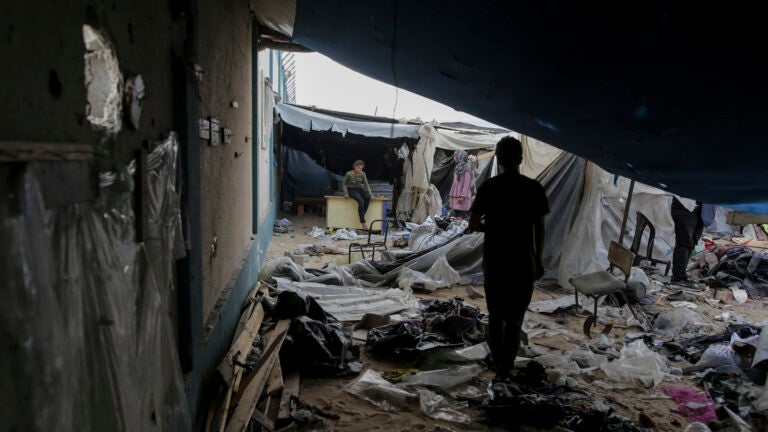Doctors say new Israeli strikes kill 16 in Rafah as residents report escalation of fighting

World News
Most hospitals in Gaza are no longer functioning. Kuwait’s Rafah hospital closed its doors on Monday after a strike near its entrance killed two health workers.

Displaced Palestinians inspect their tents destroyed by Israeli shelling, annexes to an UNRWA facility west of the town of Rafah, in the Gaza Strip, Tuesday, May 28, 2024. AP Photo/Jehad Alshrafi
DEIR AL-BALAH, Gaza Strip (AP) — New Israeli strikes on Rafah killed at least 16 Palestinians, first responders said Tuesday, as residents reported an escalation of fighting in the southern Gaza city once considered as the last refuge of the territory.
An Israeli incursion launched in early May pushed nearly a million people to flee Rafah, most of whom had already been displaced in the war between Israel and Hamas. They now seek refuge in squalid tent camps and other war-torn areas.
The United States and other close allies of Israel have warned of a full-fledged offensive in the city, with the Biden administration saying it would cross a red line and refusing to provide offensive weapons for such an endeavor. The International Court of Justice on Friday called on Israel to end its offensive on Rafah, an order it has no power to enforce.
Prime Minister Benjamin Netanyahu has pledged to move forward, saying Israeli forces must enter Rafah to dismantle Hamas and return hostages taken in the Oct. 7 attack that sparked the war.
The latest strikes took place in the same area where Israel targeted what it called a Hamas compound on Sunday evening. The strike sparked a fire in a camp for displaced Palestinians and killed at least 45 people, according to local health authorities, sparking global outrage.
Netanyahu called it a “tragic incident” and the army said it was investigating.
The new strikes killed a total of 16 people overnight in the Tel al-Sultan neighborhood, northwest of Rafah, according to the Palestinian Civil Defense and the Palestinian Red Crescent.
Israel says it is carrying out limited operations in eastern Rafah, along the Gaza-Egypt border. But residents also reported intense shelling overnight in western parts of Rafah.
“It was a night of horror,” said Abdel-Rahman Abu Ismail, a Palestinian from Gaza City who has taken refuge in Tel al-Sultan since December. He said he heard “constant sounds” of explosions overnight and into Tuesday, with fighter jets and drones flying over the area.
He said it reminded him of the Israeli invasion of his Shijaiyah neighborhood in Gaza City, where Israel launched an intensive bombing campaign before sending in ground forces in late 2023. “We’ve seen this before,” did he declare.
Sayed al-Masri, a resident of Rafah, said many families were forced to flee their homes and shelters, most heading to the crowded Muwasi area, where camps of giant tents were set up on a coast arid, or to Khan Younis, a southern city which suffered heavy damage during months of fighting.
“The situation is getting worse” in Rafah, al-Masri said.
Gaza’s health ministry said two medical facilities in Tel al-Sultan were out of service due to intense shelling nearby. Medical Aid for Palestinians, a charity operating across the territory, said the Tel al-Sultan medical center and Indonesian field hospital were on lockdown, with doctors, patients and displaced people trapped inside.
Most hospitals in Gaza are no longer functioning. Kuwait’s Rafah hospital closed its doors on Monday after a strike near its entrance killed two health workers.
A World Health Organization spokesperson said victims of Sunday’s strikes and fires had “completely overwhelmed” the region’s field hospitals, which were already short of supplies to treat serious burns.
“It requires intensive care, it requires electricity, it requires high-level medical services,” Dr. Margaret Harris told reporters in Geneva. “More and more, we are having trouble getting highly qualified doctors and nurses because they have been displaced. »
The war began when Hamas and other militants stormed into southern Israel in a surprise attack on October 7, killing some 1,200 civilians and kidnapping about 250. More than 100 were freed during of a one-week ceasefire in November in exchange for Palestinians imprisoned by Israel. .
Israel responded to the attack with a massive air, land and sea offensive that killed at least 36,096 Palestinians, according to Gaza’s health ministry, which does not distinguish between fighters and civilians in its tally. About 80 percent of Gaza’s 2.3 million residents have been displaced, and United Nations officials say parts of the territory are experiencing famine.
Magdy reported from Cairo. Associated Press writer Jamey Keaten in Geneva contributed.
Additional news alerts
Get the latest updates as they happen.
Boston





